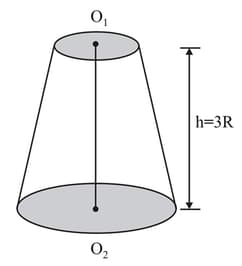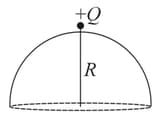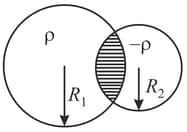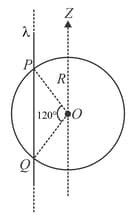Gauss’s Law and Its Applications
Important Questions on Gauss’s Law and Its Applications
A frustum is cut from a right circular cone. The two circular faces have radii and and their centers are at and respectively. Height of the frustum is . When a point charge is placed at , the flux of electric field through the circular face of radius is and when the charge is placed at , the flux through the other circular face is The ratio of is found to be . The value of is

A circular disc of radius carries surface charge density where is a constant and is the distance from the center of the disc. Electric flux through a large spherical surface that encloses the charged disc completely is Electric flux through another spherical surface of radius and concentric with the disc is Then the ratio is , the value of is___
The electric field inside a sphere which carries a volume charge density proportional to the distance from the origin ( is a constant) is:
A very long charged solid cylinder of radius contains a uniform charge density . Dielectric constant of the material of the cylinder is What will be the magnitude of electric field at a radial distance from the axis of the cylinder ?
An infinitely long thin non-conducting wire is parallel to the axis and carries a uniform line charge density . It pierces a thin non-conducting spherical shell of radius in such a way that the arc subtends an angle at the centre O of the spherical shell, as shown in the figure. The permittivity of free space is . Which of the following statements is (are) true?
A point charge is placed just outside an imaginary hemispherical surface of radius as shown in the figure. Which of the following statements is/are correct?

Two non-conducting spheres of radii and and carrying uniform volume charge densities and , respectively, are placed such that they partially overlap, as shown in the figure. At all points in the overlapping region

A solid sphere of the radius has a charge distributed in its volume with a charge density where and are constants, and is the distance from the centre. If the electric field at is times that at , Find the value of .
An infinitely long thin non-conducting wire is parallel to the -axis and carries a uniform line charge density . It pierces a thin non-conducting spherical shell of radius in such a way that the arc subtends an angle at the centre of the spherical shell, as shown in the figure. The permittivity of free space is . Which of the following statements (are) true?

Two uniformly long charged wires with linear densities and are placed along and axis respectively. Determined the slope of electric field at any point on the line .

